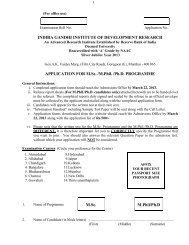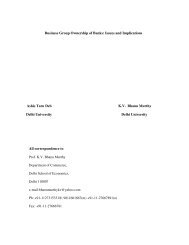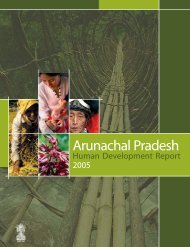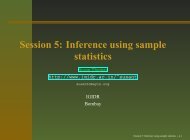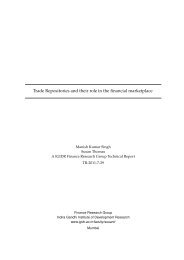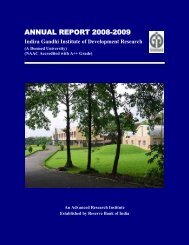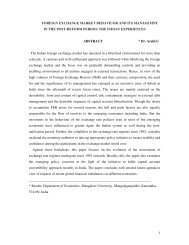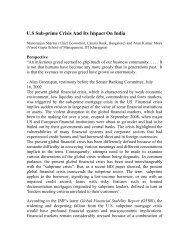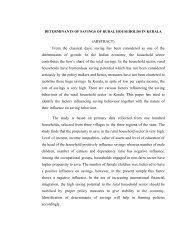National Human Development Report: 2001 - Indira Gandhi Institute ...
National Human Development Report: 2001 - Indira Gandhi Institute ...
National Human Development Report: 2001 - Indira Gandhi Institute ...
- No tags were found...
Create successful ePaper yourself
Turn your PDF publications into a flip-book with our unique Google optimized e-Paper software.
94SOME OTHER ASPECTS OF WELL-BEINGNATIONAL HUMAN DEVELOPMENT REPORT <strong>2001</strong>private medical practitioners can<strong>National</strong> Policy for Older Personscollectively provide a reasonablyeffective, accessible and affordableThe <strong>National</strong> Policy for Older Persons was announced by the Government inmedical health care system to mostJanuary 1999. The goal of the policy is the well-being of the older persons. Itpeople, both in rural and urban areas.aims to strengthen their legitimate place in society and help them live their lifeStates like Himachal Pradesh havewith purpose, dignity and peace. The policy, inter alia provides for:shown that public health care system• State to extend support for financial security, health care, shelter, welfare andcan deliver basic medical and healthother needs of older persons; provide protection against abuse andcare services even in rural areas.exploitation; make available opportunities for development of the potentialThe issue of shelter for the elderly,of older people; seek their participation and provide services to improveoutside the traditional family system,quality of their life.in the form of old age homes,• Affirmative action in favour of the elderly, especially elderly females tocommunity and recreational centresprevent their becoming victims of neglect and discrimination on account offor the aged, have not beengender, widowhood and age.addressed systematically both by the• Empowerment of older persons to enable better control over their lives andpublic agencies as also the civilparticipation in decision-making.society initiatives in most of the• Increased budgetary support from the State with equal attention to the ruralStates. There are critical gaps, whichand urban poor.are going to widen further, in thedemand and supply of such services.There is a considerable scope for extending legislative and policy support toimprove coverage and access of the elderly to these services. It is alsoimportant to address the issue of regulating and introducing standardisationin the services through better enforcement of the rules and regulationsgoverning such services.In the coming years with increasing number of the elderly, more so ofelderly women, makes it necessary to suitably reflect the economic, socialand physical concerns of the older people in public policies, programmes andinterventions as also in the mobilisation of the civil society. Theoperationalisation and careful implementation of the <strong>National</strong> Policy forOlder Persons could be a useful starting point.ChildrenChild Labour-Conceptual Ambiguities and MagnitudeIn India, despite acceptance of international standards andcommitments on restricting the use of child labour, the existence of anational child labour policy, wide-spread national and State level laws andregulations, millions of children are engaged in work, often under hardshipor hazardous conditions. It deprives them of their childhood and theirdignity and is detrimental to their health, education, and more importantly,in developing capabilities and availing opportunities as normal individuals inthe society.As per the Census of India, there were 10.75 million child workers inthe age group 5-14 years in 1971, 13.64 million in 1981 and 11.28 million in1991. In absolute terms, there is no trend in the number of working childrenat the national level, though there is some decline in the incidence of childlabour. This is only expected considering the period 1971-1991 has recordedthe highest decadal population growth in independent India. It is only in the





